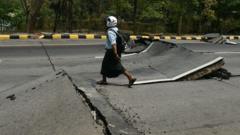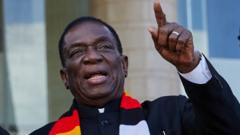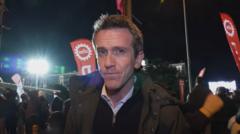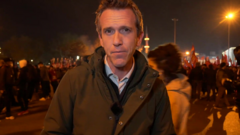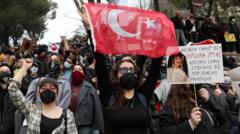Hundreds of Gazans participated in the largest anti-Hamas protest since the onset of conflict, voicing anger over continued violence and calling for leadership change. Masked militants forcibly ended the demonstration, showcasing the tension between public sentiment and Hamas control.
Public Dissent Grows in Gaza as Anti-Hamas Protests Erupt
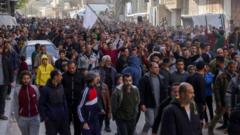
Public Dissent Grows in Gaza as Anti-Hamas Protests Erupt
Amid ongoing conflict, protests against Hamas signal rising public discontent and demand for leadership change.
Hundreds of people participated in what has been described as the largest anti-Hamas protest in Gaza since the outbreak of conflict with Israel, calling for the militant group to relinquish control. Demonstrators gathered in Beit Lahia, chanting slogans like "out, out, out, Hamas out," expressing their frustrations with the group's continued governance amid ongoing war. However, the protest was forcefully halted when masked Hamas militants intervened, reportedly assaulting some participants.
Videos circulated on social media depict young men marching through the streets, showcasing dissent that has emerged more vocally since the latest escalation of violence. Pro-Hamas advocates countered the protests by labeling participants as traitors and downplaying the demonstrations' impact. Meanwhile, Hamas has not issued a formal response to the protests, which were sparked by recent violence in the region.
The protests occurred shortly after Islamic Jihad launched rockets toward Israel, which led to widespread evacuations in Beit Lahia and increased public unrest. The Israeli military commenced renewed operations in Gaza after a two-month ceasefire, attributing the escalation to Hamas rejecting a new truce proposal from the United States. In retaliation, Hamas accuses Israel of undermining previously agreed terms of the ceasefire.
As described by one protester, Mohammed Diab, who tragically lost his home and brother due to the conflict, voices from the rubble succinctly reflect the pain of Gazans. Diab addressed the crowd, calling for Hamas to step down and allow the population to recover from the devastation.
Hamas has maintained control over Gaza since 2007 after winning elections and subsequently ousting political rivals. Nevertheless, the perceived failure of Hamas to address the needs and safety of civilians has led to increasing public criticism both on the streets and on social media.
Despite the possible limits of demonstrating openly against Hamas due to fears of reprisal, dissent has steadily increased as support for the organization faces challenging realities amid violence and humanitarian concerns. As the ongoing conflict has resulted in significant casualties and displacement, calls for immediate change resonate louder across Gaza, altering the once-monolithic support landscape.
While Hamas continues to be a predominant force in the area, activists express that dissatisfaction is growing. They urge the group to reassess its leadership for the sake of the grieving population, which they feel is simply viewed as statistics in a broader conflict. In total, the war has claimed thousands of lives and resulted in the displacement of many Gazans, amplifying cries for accountability and change against the backdrop of continued bloodshed.




